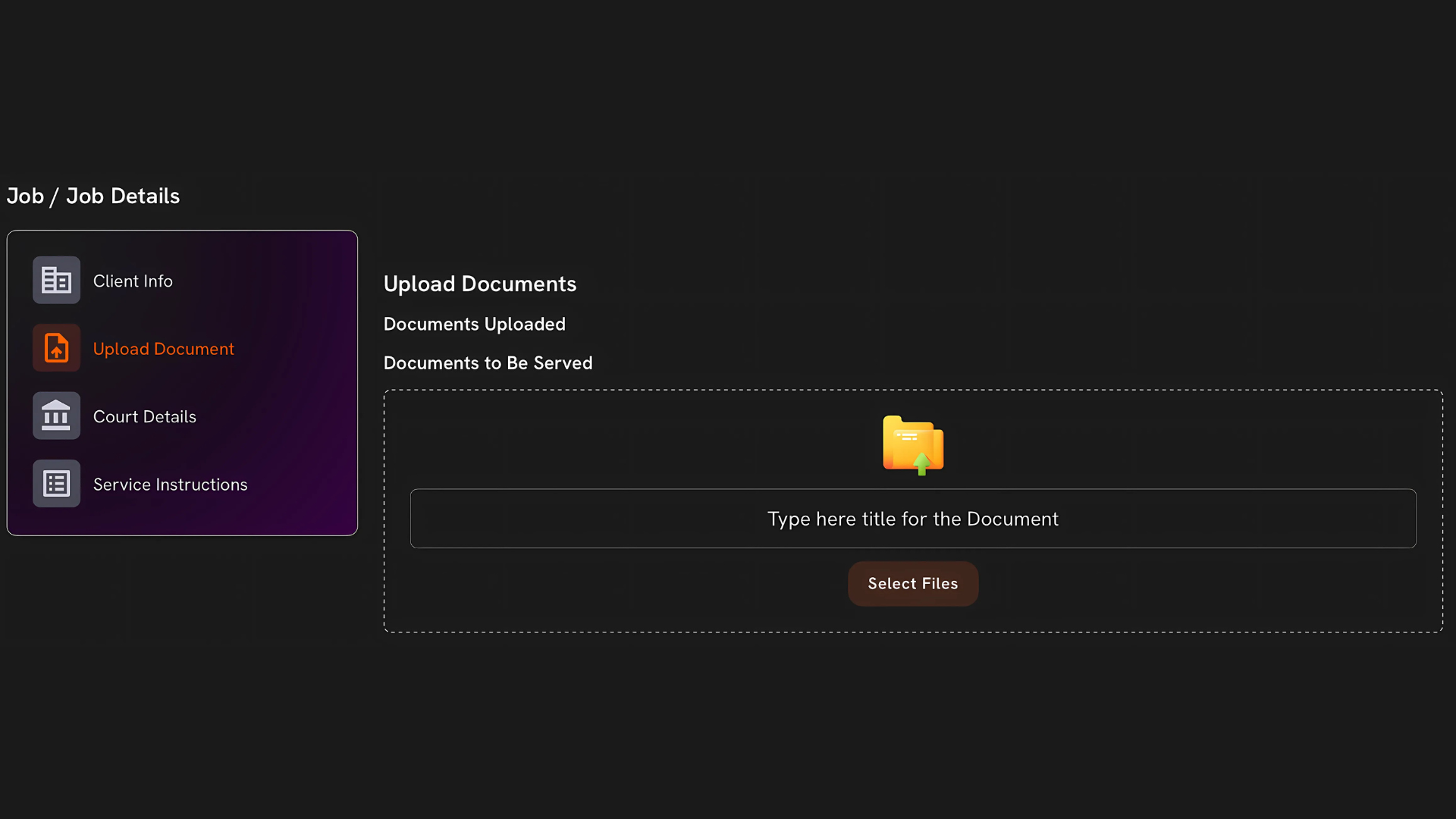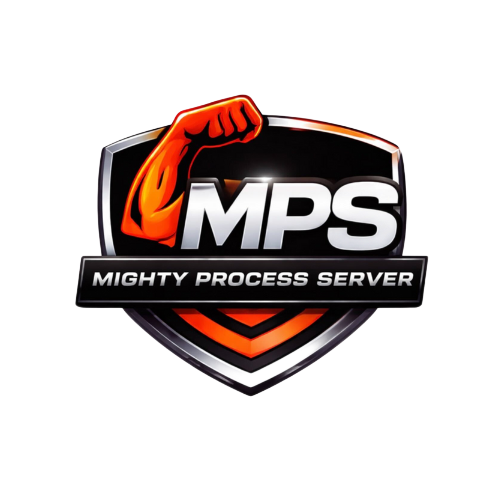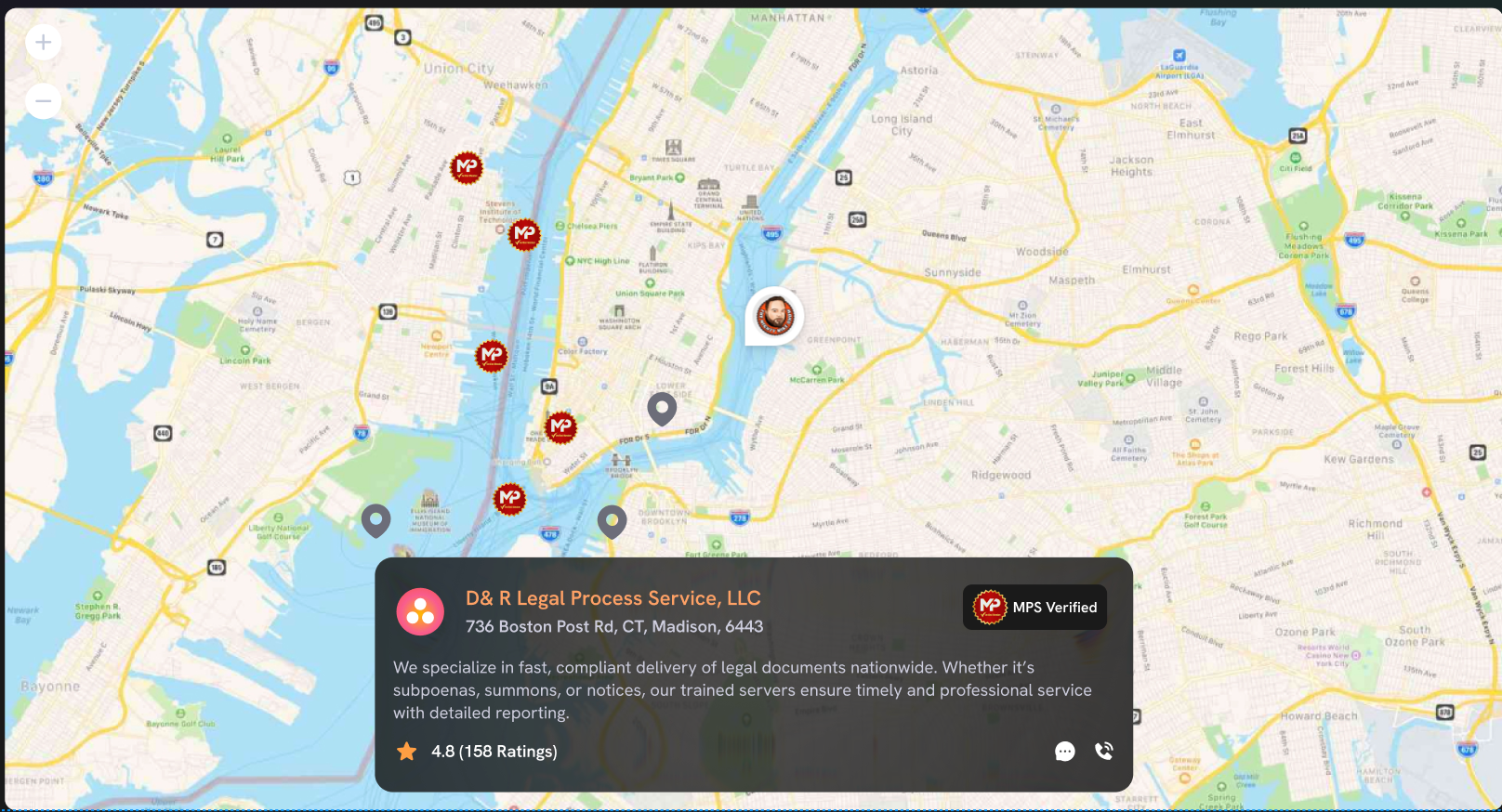Top Law Firms Choose
MIGHTY PROCESS SERVER
The first all-in-one case management solution connecting Law Firms and 10,000+ Process Servers Nationwide!
Step 1 : Upload Your Documents
Quickly upload your legal documents and create a job post in minutes. Once posted, process servers in our nationwide network will review your request and submit same-day bids—so you can choose the best fit for your service needs fast.

Step 2 : Select from 10,000+ Independent Process Servers Nationwide
Browse and compare vetted process servers based on price, reviews, and experience. With over 10,000 professionals across all 50 states, you can choose the right server for your job—fast and with confidence.
Step 3 : Get real time status updates
Stay informed every step of the way with live status updates, instant messaging, and transparent job tracking—all from your secure dashboard. No more guessing where your serve stands.
Step 4 : Affidavit Generation and Secure Document Signing
Once service is complete, automatically generate your affidavit with all required details. Review, sign, and download securely—no printing, scanning, or delays.
Case Management and Automation Solutions for Legal Support Professionals
Mighty Process Server
FAQs
Got a questions? We Got Answers!
-
What is a process server, and why are they important?
A process server is a legal professional responsible for delivering legal documents, such as summonses, subpoenas, and complaints, to individuals involved in a court case. Their role is essential to ensure that all parties are notified of their legal obligations, upholding due process.
-
What are the steps to become a licensed process server?
Becoming a process server involves understanding and complying with local laws, which may require licensing or registration. Some states require formal training, while others may allow on-the-job learning. It’s important to research your state's specific requirements.
-
What is a Skip Trace / Locate Report?
A Locate Report, commonly referred to as a Skip Trace Report in the context of private investigations, is a specialized document that provides crucial information about the whereabouts of an individual or the location of an asset. This report is instrumental for legal professionals, debt collectors, and private investigators in locating missing persons, defendants, witnesses, or debtors who are difficult to find through standard search methods.
The Skip Trace Report utilizes a wide array of resources and databases—public records, credit reports, background checks, and more—to compile a detailed profile that includes current and past addresses, associated phone numbers, employment information, and other relevant personal details. The purpose of this report is not only to locate the individual but also to provide a comprehensive overview of their recent activities and connections, thereby increasing the likelihood of a successful locate.
Ideal for use in legal proceedings, debt recovery, and personal cases, the Locate Report or Skip Trace Report is a powerful tool that ensures thorough investigation and significant results, tailored to meet the specific needs of our clients.
-
What documents can a process server deliver?
Process servers deliver a variety of legal documents, including subpoenas, summonses, writs, complaints, and other notifications related to court proceedings.
-
Do process servers need to be licensed?
Licensing requirements vary by state. Some states require process servers to be licensed or registered, while others do not. It’s crucial to check the regulations in your jurisdiction. Check out Our State Laws Page for More Info
-
What are the legal risks in process serving, and how can I mitigate them?
Legal risks include improper service, which can result in legal penalties or case dismissals. Mitigation involves thorough training, staying updated with legal requirements, and maintaining accurate records of service attempts.
-
What should I do if a defendant refuses to accept the documents?
In many states, if a defendant refuses to accept documents, the process server can leave them at the defendant’s feet or in a nearby location. The key is to ensure that the defendant is aware of the service attempt.
-
How do I start a process serving business?
Starting a process serving business involves creating a business plan, obtaining necessary licenses, registering your business entity, and securing insurance. You’ll also need to set up operational systems like case management software and develop a marketing strategy.
-
What additional services can a process serving company offer?
Complementary services include skip tracing, court filing, document retrieval, notary services, and mobile fingerprinting, which can add value and diversify your revenue streams.
-
How should I price my process serving services?
Pricing should take into account the complexity of the service, travel costs, urgency, and local market rates. Routine services may be priced differently than rush or same-day services.
-
How do I manage and track my process servers effectively?
Utilizing case management software allows for efficient tracking of service attempts, client communications, and operational workflows. Regular performance evaluations and ongoing training are also important for maintaining high standards.
-
How can I scale my process serving business?
Scaling involves expanding your service area, hiring additional staff, automating processes, and offering additional legal support services. Strategic marketing and building partnerships with law firms can also drive growth.
-
What should I consider when hiring additional process servers?
Key considerations include the candidate’s experience, knowledge of legal procedures, reliability, and communication skills. Ensure that new hires are well-trained and understand local legal requirements.
-
How can I effectively market my process serving business?
Effective marketing strategies include building a professional website optimized for SEO, networking with legal professionals, leveraging online directories, and maintaining a strong social media presence. Obtaining positive reviews and testimonials can also enhance credibility.
-
What are the key elements of a successful process server website?
A successful website should feature a simple and professional design, compelling content that answers client questions, optimized SEO for visibility, and easy navigation. Make sure your contact information is easily accessible and your site loads quickly.
-
How can I build strong relationships with clients?
Building strong relationships involves providing consistent, reliable service, maintaining open communication, and adhering to ethical standards. Regular updates on service status and prompt responses to client inquiries are essential.
-
What should I do when business is slow?
During slow periods, consider diversifying services, improving marketing efforts, or reaching out to existing clients for additional work. Networking with other process servers or legal professionals can also lead to new opportunities.
-
How can I handle complaints and improve customer satisfaction?
Handling complaints involves listening to client concerns, addressing issues promptly, and ensuring that similar problems do not occur in the future. Regularly seeking client feedback can help you identify areas for improvement.
-
How do I ensure compliance with state laws when serving documents?
Staying compliant requires thorough knowledge of state and local regulations, proper training of staff, and maintaining detailed records of all service attempts. When in doubt, consulting a legal professional is advisable.
-
How should I structure my process serving business legally?
Many process servers choose to structure their business as an LLC (Limited Liability Company) for legal protection and tax advantages. It’s important to consult with a legal or financial advisor to determine the best structure for your business.
-
What are the costs associated with starting a process serving business?
Initial costs may include licensing fees, insurance, office setup, marketing, and purchasing necessary tools such as case management software. It’s important to budget for these expenses to ensure smooth operations.
-
How do I handle difficult or evasive individuals during service?
Serving evasive individuals may require multiple attempts, alternative methods like service by publication, or using skip tracing to locate them. It’s important to follow legal procedures carefully to avoid any issues.
-
What should I include in a process server’s contract?
A process server’s contract should cover the scope of work, fees, timelines, confidentiality, liability clauses, and terms of service. Clear contracts help protect both the service provider and the client.
-
What should I consider when expanding into new service areas?
When expanding, consider the legal requirements of the new area, the demand for process serving, and the competition. Developing partnerships with local legal professionals can ease the transition.
-
How do I keep up with changes in the legal industry?
Stay informed by joining professional associations, attending industry events, subscribing to legal newsletters, and participating in continuing education opportunities. Networking with other professionals can also provide valuable insights.
-
How can networking benefit my career as a process server?
Networking can significantly benefit your career as a process server in a variety of ways:
1. Increase Referrals and Client Base
Law Firms and Legal Professionals: Building relationships with local attorneys, paralegals, and legal assistants can lead to repeat business. They often require trusted and reliable process servers.
Other Process Servers: Fellow process servers, especially those in different regions, can refer jobs to you when they have a conflict or can't cover your area.
Business Relationships: Partnering with businesses that regularly deal with legal documents, such as real estate agencies, debt collection firms, or government offices, can create a steady flow of referrals.
2. Learn Best Practices
Networking with other professionals in the legal field and other process servers can help you stay updated on the latest best practices, legal changes, and tips on how to handle difficult cases.
You can also exchange strategies for working in different environments, from serving in urban areas to navigating more challenging rural locations.
3. Build a Strong Reputation
A strong network leads to word-of-mouth referrals, which can build your reputation in the legal community. Positive testimonials from law firms, legal professionals, and even other process servers can establish your credibility, leading to increased business.
4. Gain Business Opportunities
Networking events, whether local meet-ups or industry conferences, are great places to meet potential clients and collaborators. You may discover joint venture opportunities, such as partnering with an attorney who regularly handles complex litigation requiring a reliable process server.
You can also connect with companies needing nationwide process serving, which can broaden your scope.
5. Access Mentorship and Guidance
More experienced professionals can provide mentorship, helping you avoid common pitfalls and guiding you through challenging or unfamiliar situations.
Learning from others' experiences can help you expand your service offerings, such as skip tracing or mobile notary services.
6. Marketing and Branding Insights
Interacting with others in the legal industry can give you valuable insights into how to market your services more effectively.
Collaborating with marketing professionals or attending networking events that focus on legal services could give you ideas for improving your online presence, SEO, or local marketing campaigns.
Networking can ultimately position you as the go-to process server in your region, increasing your job volume and enabling you to raise your rates.
-
What are common challenges faced by new process servers?
New process servers often encounter several challenges as they begin their careers. Here are some common ones and tips on how to navigate them:
1. Legal Knowledge and Compliance
Challenge: Many new process servers struggle to fully understand the specific legal requirements for serving documents, which can vary by jurisdiction.
Solution: It's essential to stay updated on local, state, and federal regulations, as mistakes can lead to improper service, delaying legal proceedings. Investing in training and joining professional associations like NAPPS (National Association of Professional Process Servers) can help ensure you're compliant with all relevant laws.
2. Handling Difficult or Hostile Individuals
Challenge: Process servers frequently encounter individuals who are angry, evasive, or even violent when served with legal documents.
Solution: Develop strong communication skills and de-escalation techniques. Being patient and calm, as well as knowing your legal rights to safely complete the service, is key. In high-risk situations, it's sometimes advisable to bring law enforcement along.
3. Locating Individuals (Skip Tracing)
Challenge: People who are avoiding service can be difficult to locate. New process servers may find it hard to track down evasive individuals, particularly without experience in skip tracing.
Solution: Learning skip-tracing techniques or partnering with a skip tracer can help overcome this challenge. There are online databases and software tools that can assist with finding individuals.
4. Managing Time and Scheduling
Challenge: Balancing multiple cases, especially in different locations, can be a logistical nightmare. New process servers might struggle with time management and covering large areas.
Solution: Develop a solid scheduling and routing system. Using tools like GPS, route optimization software, and case management systems will help improve efficiency. Also, prioritizing cases by deadline is crucial for timely service.
5. Physical and Mental Demands
Challenge: Process serving can be physically and mentally taxing. The job often requires long hours of driving, walking, and dealing with emotionally charged situations.
Solution: Take care of your health and well-being. Practicing stress management and ensuring you have time for breaks during your workday is important. Keep your car well-maintained and ensure you’re prepared for long stretches on the road.
6. Building a Client Base
Challenge: Many new process servers find it difficult to attract clients initially. Without a strong network, it’s tough to get consistent work.
Solution: Focus on networking with law firms, attorneys, paralegals, and other legal professionals in your area. Building relationships with these individuals will help generate referrals. Create a professional website, such as what you're doing with MightyProcessServer.com, to enhance your online presence.
7. Ensuring Proper Documentation
Challenge: Keeping accurate and detailed records of each service attempt is crucial, but new process servers may not know how to properly document their actions.
Solution: Always note the time, date, location, and details of each service attempt. Using software that helps organize these records, such as mobile apps designed for process servers, can simplify the process and ensure that proof of service is legally valid.
8. Safety Concerns
Challenge: There can be safety concerns, especially when serving in unfamiliar or unsafe areas. The unpredictability of human behavior also makes some situations dangerous.
Solution: Always assess your surroundings before attempting a serve, and consider safety measures like informing someone of your whereabouts or having a partner accompany you when serving in high-risk areas.
9. Financial Stability and Consistent Income
Challenge: In the early stages, it may be challenging to achieve a steady stream of income, especially if you're starting out without many clients.
Solution: Building strong relationships with repeat clients, such as law firms, and diversifying services (e.g., mobile notary, skip tracing) can help ensure a steady income flow. Over time, as your reputation grows, so will your client base.
10. Technology and Tools
Challenge: Adapting to process-serving software, tracking tools, and mobile apps can be overwhelming for new servers unfamiliar with the technology.
Solution: Take time to learn the technology available in the industry, as it can simplify your work and improve your efficiency. Attend training sessions or join process server groups where you can ask about the best tools others are using.
11. Court Appearances
Challenge: In some cases, process servers may need to testify in court to verify proper service. This can be daunting for someone new to the industry.
Solution: Keep thorough records and learn how to present your case calmly and clearly in court. Familiarize yourself with courtroom procedures to feel more confident if you're called to testify.
Addressing these challenges early in your career can make you more effective and efficient. As you gain experience, many of these obstacles will become easier to handle.
What's
On Your
Mind?
Contact Us
We will get back to you as soon as possible.
Please try again later.



